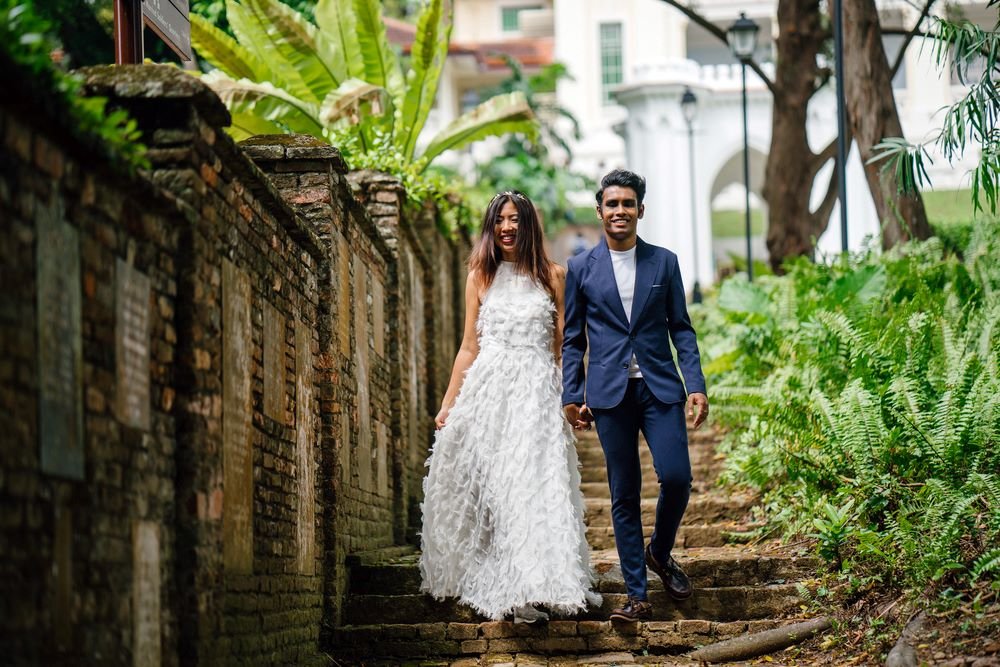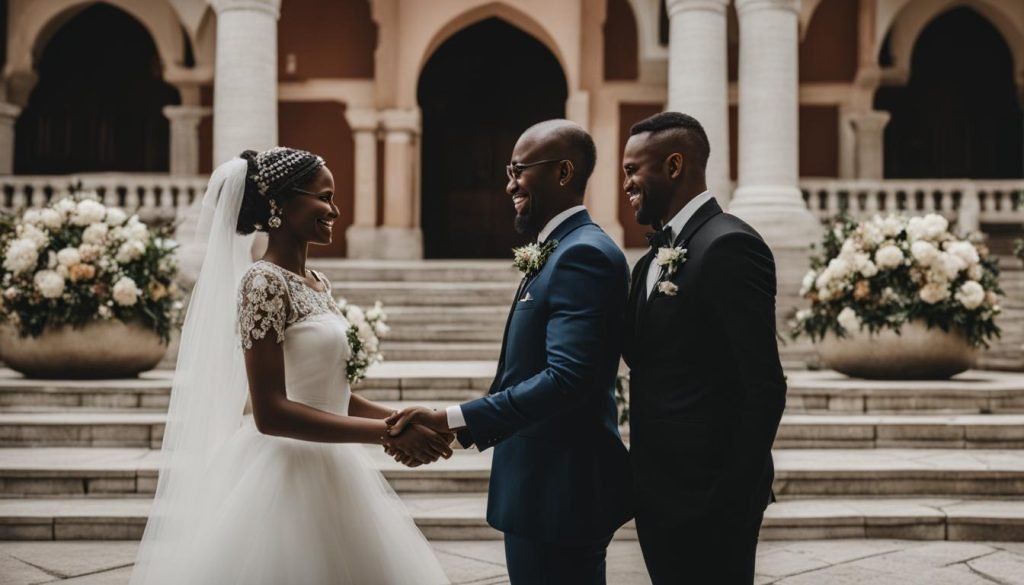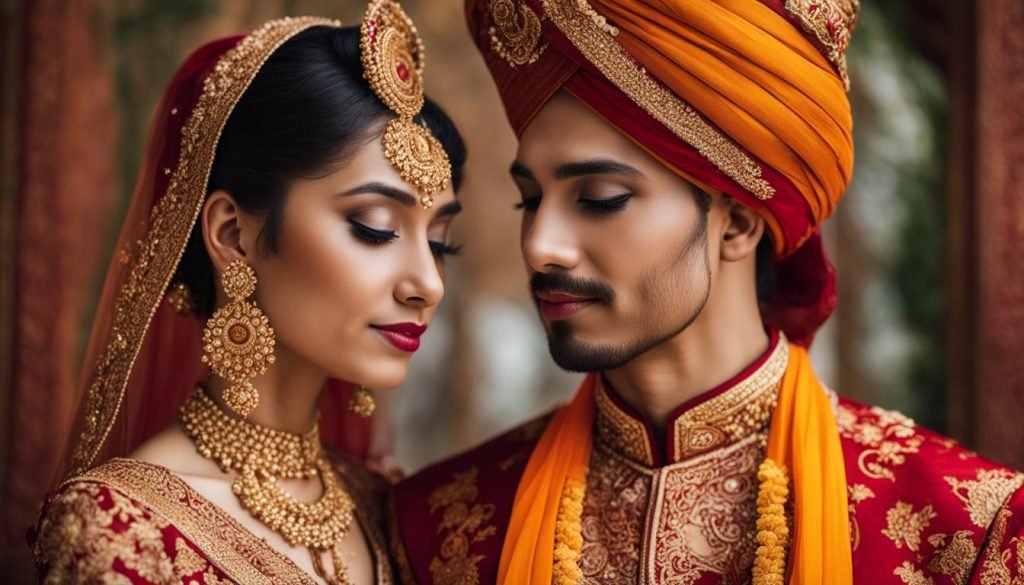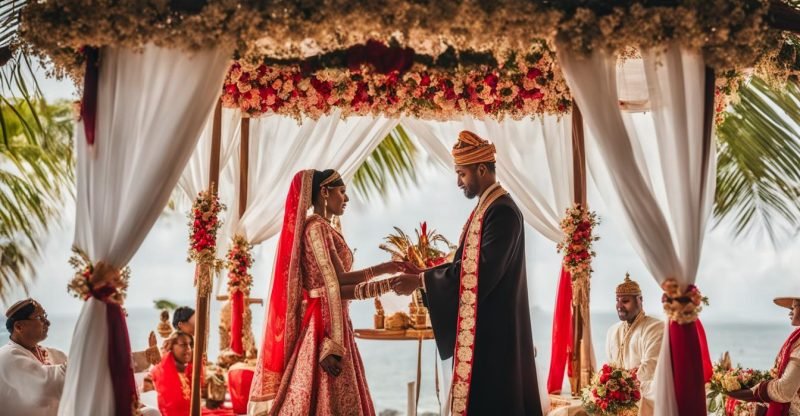Embracing Traditions: Navigating Cultural Considerations in Destination Weddings
Planning a destination wedding in a foreign country brings excitement and adventure, but it also comes with the challenge of language and cultural barriers. To ensure a seamless wedding experience, it is crucial to research and familiarize yourself with the local language, customs, and traditions. By hiring local professionals, utilizing language translation tools, and embracing local customs, you can navigate these challenges with ease and create a truly unforgettable wedding celebration with some Cultural Considerations in Destination Weddings.
This comprehensive guide provides essential insights and tips for couples on integrating cultural elements into their destination weddings respectfully and seamlessly.
Key Takeaways:
- Research and familiarize yourself with the culture and customs of your chosen destination to communicate effectively and respect the local culture.
- Hire local professionals such as wedding planners, vendors, and interpreters to facilitate the planning process and navigate cultural sensitivities.
- Utilize language translation tools and apps to bridge the language gap and ensure clear communication with local vendors and venues.
- Communicate clearly and concisely, using simple language and written communication to avoid miscommunication.
- Embrace and incorporate local customs and traditions into your wedding celebration to enhance authenticity and foster a deeper connection with the local community.

Introduction to Cultural Diversity in Weddings
Wedding traditions vary greatly between countries and cultures across the world. From pre-wedding rituals to attire, ceremonies, food, décor, music and more – there are countless ways that nuptial celebrations beautifully reflect local customspractices.
For instance, some global wedding traditions include Nigerian brides and grooms wearing matching fabrics, Scottish grooms wearing kilts, Chinese tea ceremonies symbolizing the blending of two families, Moroccan henna parties, English brides carrying horseshoes for good luck, Indian multi-day wedding festivities and exchanging floral garlands, and many more unique practices.
While a typical Western white wedding in a church may be commonplace in America, wedding customs in other parts of the globe are wonderfully diverse. That’s what makes planning an international destination wedding so intriguing yet complex to navigate.
Having awareness and appreciation for different cultural traditions allows you to thoughtfully incorporate meaningful elements into your special day rather than an appropriative façade. An authentic celebration deeply rooted in local culture creates elevated significance and enrichment for couples as well as greater respect and engagement from their guests.
Researching the Culture and Customs
The best way to gain understanding into foreign wedding customs is through thorough research and expert guidance. Some recommendations on where to begin your cultural discovery include:
Local Wedding Planners
Reputable wedding planners native to the country are priceless resources regarding local marriage traditions and putting together suitable celebrations. They can advise on customary rituals, etiquette rules, venue ideas, attire norms, and recommended local vendors.
Culture Guides & Resources
There are many online culture guides that provide overviews of wedding traditions in different countries. These can help you identify unique practices to explore further. Academic articles and cultural organization resources also offer insightful background.
Travel Guide Books
Guide books like Lonely Planet and Fodor’s detail common cultural wedding customs and faux pas to avoid in different locales. These offer a helpful starting point for destination wedding research.
Forums & Facebook Groups
Connect with others planning weddings in your chosen locale through forums and social media groups. People are usually happy to share insights from their first-hand cultural wedding planning experiences.
Ethnic Communities
If your wedding destination has ethnic enclaves in your home country, consider reaching out to community associations and religious centers to gain wedding tradition insights from people originating from that culture.
Destination Wedding Expos
Some cities host conventions and expos specifically focused on planning destination weddings. These provide opportunities to meet wedding planners and vendors directly from various global wedding locations who can advise on cultural practices.
By using the right resources and cultural guides, couples can gain strong understanding of local wedding customs, rituals, etiquette rules and unique elements to incorporate into their own destination wedding celebrations.
Incorporating Local Traditions into Your Wedding
After dedicated research into your wedding destination’s cultural customs, an abundance of special touches can integrate into your nuptial festivities with elegance and respect.
The Ceremony
Consider adapting components like including indigenous readings, translating vows, exchanging symbolic offerings like garlands or candles, using traditional music instruments like the Erhu in China or Duduk in Armenia for processionals, having a customary officiant like a Pandit for Indian Hindu weddings, and more.
Attire & Accessories
From silken Saris to Vietnamese Áo dàis, looking into traditional local wedding attire provides inspiration for fashionable fusions. The couple can wear a customary outfit or accessory while wedding guests can embrace dress codes like Hawaiian shirts or guayaberas for Mexico. Fascinators, shawls, leis, and saree drapes offer effortless flair.
Decor
Decor elements bring vibrance with cultural symbols, florals, colors and designs unique to the wedding locale like parasols for Burmese influences or marigolds and mango leaves for Indian flair. Use regional handicrafts like Mexican tin luminarias, Thai textiles, Balinese wood carvings or Japanese origami to heighten authentic décor.
Cuisine
Catering that incorporates traditional dishes, street food stations with regional specialties, locally sourced ingredients, and signature cocktails fusing local flavors allows guests to partake culturally. Think Peruvian ceviche, Portuguese sweet rice, or Turkish baklava and tea.
Music & Dance
Choose live music like Celtic bagpipers, Spanish flamenco guitar, Javanese gamelan ensemble or Mariachi trumpets to set festive tones. Having instructors lead guests in customary dances like Brazilian samba, Israeli hora, Irish Ceilidh or Italian tarantella ensures lively fun!
Rituals & Activities
Incorporate symbolic rituals from cultural wedding practices like Korean Pyebaek ceremonies, Nigerian cake cutting ceremonies led by the bride’s mother, Chinese tea ceremonies, Moroccan henna tattoo artists, Cambodian blessing processions, releasing doves/lanterns, sand ceremonies, relatable vow translations and more.
Infusing your nuptials with such details allows you to meaningfully embrace and celebrate the alluring local culture of your wedding destination.
Guest Etiquette and Preparation
For culturally-respectful celebrations, preparing your guests with helpful etiquette guidelines prevents awkwardness and honors local custom. Ensure guests understand acceptable:
● Attire & Dress Codes – Cover shoulder/knees? Avoid white? Color options? Traditional costume portions?
● Wedding Gifts – Monetary gifts customary? Gift registries? Local gift ideas?
● Wedding Contributions – Any customary fees/envelopes expected?
● Greetings – Bowing, cheek kissing, hand gestures to use/avoid?
● Body Language – Sitting positions? Pointing feet? Eye contact norms?
● Conversation Topics & Taboos – Politics/religion avoidance? Other discussion customs?
● Food & Drink – Eating styles? Left hand prohibitions? Toasting customs? Dietary options?
● Photography – Pose restrictions? Culturally sensitive sites? Shrines/temple rules?
● Ceremony Conduct – Seating sides? Processional timing? Videography restrictions? Applause moments? Standing times? responsive phrases/chanting? Restricted photography angles?
Thorough guest guidelines ensure everyone feels relaxed, avoids missteps, and fully engages in the culturally-enriching celebration. It also demonstrates your deep respect for local customs.
Cultural Sensitivity and Avoiding Missteps
Exoticism and romanticizing foreign cultures, especially from a Western lens, can lead to unintentionally offensive gaffes. Having awareness of cultural appropriation pitfalls helps circumvent them.
Cultural Appropriation vs Appreciation
Appropriation involves wrongly adopting parts of a minority culture insensitively, while appreciation means respectfully embracing cultural elements with deference. Assess if your wedding plans ignorantly implement exotic stereotypes or token symbols versus authentically honoring traditions.
Avoid Shallow Representations
For instance, using generic Indian costumes from a Halloween store without understanding meanings perpetuates demeaning exotification. Instead, connect with local designers and tailors to create thoughtfully adapted attire.
Don’t Turn Cultures into Accessories
Having intricate Henna without knowing its purpose or a generic Chinese dragon lacking deeper significance risk propogating “accessory cultures”. Do thorough research beforehand to truly understand each cultural touchpoint.
Confer with Community Stakeholders
Connect with cultural associations, religious centers, community leaders and native wedding planners to check that your plans don’t include sacred rituals requiring deeper engagement or exclusions.
Having an ethically minded approach ensures your wedding thoughtfully incorporates cultural elements in appreciation rather than appropriation.
Advantages of Hiring Local Wedding Vendors
Hiring reputable local vendors intimately familiar with cultural wedding customs is instrumental for seamlessly integrating meaningful touches. They can provide:
- Expert communication in the local language
- Access to local resources and vendors
- Insight into the best venues and accommodations
- Cultural sensitivity and understanding
- Support for the local economy
- Insight on traditional wedding timeline/structure expectations
- Guidance on customary family roles & responsibilities
- Etiquette advice to avoid faux pas
- Tailoring regional cuisine/desserts
- Sourcing/designing authentic décor
- Recommending suitable venues
- Arranging symbolic performers/rituals
- Ensuring legal/religious requirements are met
- Liaising respectfully with community stakeholders
- Translating/explaining customs for guests
Having a capable team handling logistics allows you to immerse in celebrations without concern. Be sure to communicate openly, explain goals clearly and check-in regularly to keep aligned.
Legal and Religious Considerations
Marriage laws, eligibility rules and documentation requirements vary immensely globally. Some considerations include:
Legal Formalities
● Residency status limitations
● Waiting periods between arrival and marriage date
● Blood tests and health screening requirements ● Document authentications like apostilles/notarizations ● Affidavits confirming legal eligibility
● Parental approval minimum age rules ● Gender, sexuality and parental status limitations
Religious Restrictions
● Requirements like converting faiths ● Letter from religious leader approving eligibility
● Mandatory ceremonies rituals/customs ● Rules regarding gender, previous divorces, widower status
● Forbidden ceremony locales due to faith stipulations
Ensure you engage knowledgeable wedding planners and legal consultants locally to navigate all particulars seamlessly.
Utilizing Language Translation Tools
When planning a destination wedding, one of the main challenges is overcoming language barriers. Effective communication with local vendors and venues is crucial to ensure that your wedding plans are executed smoothly. Luckily, there are language translation tools available that can help bridge this communication gap.
Language translation tools and apps offer a convenient and efficient way to communicate with local vendors in their native language. These tools enable you to translate important documents, emails, and messages accurately, allowing for clear and concise communication. Whether you are using a translation app on your smartphone or hiring a professional translator, these tools can facilitate effective communication and help overcome language barriers.
With language translation tools, you can ensure that you are fully understood by your local vendors and venues. It eliminates the risk of miscommunication and confusion, ensuring that your wedding plans are executed exactly as envisioned.
Benefits of Language Translation Tools
- Accurate translation of important documents and messages
- Clear and concise communication with local vendors
- Elimination of language barriers
- Clarity in conveying your wedding plans and expectations
- Greater confidence in executing your destination wedding
By utilizing language translation tools, you can communicate effectively with local vendors and venues, ensuring a seamless and successful destination wedding experience.
| Language Translation Tools | Features |
|---|---|
| Google Translate | Instant translation of text, documents, and voice |
| iTranslate | Accurate translation with voice recognition and offline mode |
| Microsoft Translator | Translation across different devices with conversation mode |
| Papago | Real-time translation with natural language processing |
Whether you choose to use a smartphone app or a computer-based translation tool, incorporating language translation tools into your destination wedding planning process is essential. It will help you overcome language barriers, enable effective communication with local vendors, and ensure that your wedding vision is brought to life.
Communicating Clearly and Concisely

Clear and effective communication is crucial when planning a destination wedding, especially when language barriers are present. To ensure smooth communication with local vendors and venues, it is important to follow a few strategies:
Use Simple Language
When communicating with local vendors or venues, avoid using complex phrases or idioms that may not be easily understood. Use simple, straightforward language to convey your requests and requirements. This will help minimize the chances of miscommunication and ensure that everyone is on the same page.
Break Down Information
When providing instructions or information, break it down into smaller, digestible parts. This will make it easier for the recipient to understand and process the information. Use bullet points or numbered lists to organize important details and ensure clarity.
Be Patient and Understanding
Recognize that language barriers can pose challenges for both parties involved. Be patient and understanding when communicating with local vendors or venues. If there is a misunderstanding or confusion, take the time to clarify and ensure that everyone is on the same page.
Written Communication
Utilize written communication, such as emails or messaging platforms, to ensure clarity and avoid miscommunication. Written communication provides a reference point for both parties and allows for clear documentation of instructions or agreements.
By implementing these communication strategies, you can overcome language barriers and ensure that your needs and expectations are effectively communicated to local vendors and venues.
Embracing Local Customs and Traditions
Embracing and incorporating local customs and traditions into your destination wedding can create truly authentic and memorable experiences for both you and your guests. By immersing yourself in the local culture, you not only pay homage to the destination but also foster a deeper connection with the community. Here are some ways you can embrace local customs and traditions to enhance the cultural integration and authenticity of your wedding celebration.
Creating a Cultural Fusion
One way to embrace local customs is by infusing them into your wedding ceremony and reception. Work closely with your wedding planner to understand the significance of certain customs and traditions and find meaningful ways to incorporate them into your celebration. Whether it’s incorporating traditional music and dance performances, incorporating traditional attire elements, or incorporating local cuisine, these touches will add an extra layer of authenticity and cultural richness to your wedding.
Respecting and Learning from Local Customs
Part of embracing local customs is understanding and respecting their cultural significance. Take the time to learn about the customs and traditions of the destination and educate your guests. Provide them with information in advance about any unique customs they may encounter during the ceremony or reception. By actively involving your guests in the local customs, you create a sense of inclusion and appreciation for the destination’s culture.
Collaborating with Local Artisans
Engaging with local artisans and craftsmen can add an element of authenticity to your wedding. Consider incorporating locally made decorations, favors, or even traditional crafts as part of your wedding aesthetic. By supporting local artisans, you contribute to the local economy and help preserve traditional craftsmanship. It also provides an opportunity for you and your guests to take home unique and meaningful souvenirs from your destination wedding.
| Embracing Local Customs and Traditions |
|---|
| Infusing local customs into the wedding ceremony and reception |
| Respecting and learning from local customs |
| Collaborating with local artisans and craftsmen |
By immersing yourself in the local culture, you not only pay homage to the destination but also foster a deeper connection with the community.
Embracing local customs and traditions can add a touch of magic and cultural integration to your destination wedding. It allows you and your guests to experience the authenticity of the location, create meaningful memories, and establish a connection with the local community. By collaborating with local artisans, infusing customs into your ceremony, and respecting local traditions, you create a wedding experience that truly reflects the beauty and uniqueness of your chosen destination.
Providing Clear Instructions
When planning a multicultural destination wedding, it is essential to provide clear instructions to ensure that both you and your guests have a seamless and enjoyable experience. By offering information in multiple languages and including important details, you can enhance understanding and avoid any cultural wedding missteps.
Table: Multicultural Wedding Etiquette Guide
| Information | Details |
|---|---|
| Event Timings | Clearly communicate the start and end times of each wedding event. Include any time zone differences if applicable. |
| Dress Codes | Specify the dress code for each event, taking into consideration the cultural norms and the climate of the destination. |
| Cultural Considerations | Highlight any cultural or religious customs that guests should be aware of, such as appropriate greetings or gift-giving etiquette. |
| Translation Assistance | Provide translated versions of essential information, including directions, transportation options, and emergency contact details. |
By offering clear instructions, you can ensure that all guests feel comfortable and prepared for the multicultural wedding celebration.
“Clear communication is key when it comes to multicultural weddings. By providing comprehensive instructions, you can avoid any potential cultural missteps and create an inclusive and enjoyable experience for all guests.” – Wedding Planner
Planning a Site Visit or Pre-Wedding Meeting
If possible, planning a site visit or pre-wedding meeting with your local wedding planner or vendors can greatly contribute to the success of your destination wedding. This allows for face-to-face discussions, establishes a personal connection, and provides an opportunity to clarify any questions or concerns you may have. It also gives you the chance to familiarize yourself with the wedding venue and make necessary adjustments to accommodate your preferences before the big day.
During the site visit or pre-wedding meeting, you can discuss the layout of the venue, explore different ceremony and reception areas, and envision how the space will be utilized for your wedding celebration. This hands-on experience allows you to make informed decisions about decor, seating arrangements, and any other logistical considerations. Additionally, meeting with your local wedding planner or vendors in person can help establish trust and ensure that everyone is on the same page when it comes to your vision for the wedding.
Furthermore, a site visit or pre-wedding meeting provides an opportunity to address any cultural considerations specific to your destination. You can discuss local customs, etiquette, and traditions that you may want to incorporate into your wedding ceremony or reception. Your wedding planner can offer guidance on how to respectfully integrate these customs, ensuring a culturally rich and inclusive experience for both you and your guests.
Benefits of a Site Visit or Pre-Wedding Meeting:
- Face-to-face discussions with wedding planner and vendors
- Opportunity to clarify questions and concerns
- Familiarization with the wedding venue and space
- Hands-on decision-making for decor and logistics
- Establishment of trust and rapport with local professionals
- Incorporation of local customs and traditions
Overall, planning a site visit or pre-wedding meeting allows you to ensure that every detail of your destination wedding aligns with your vision and the cultural considerations of your chosen location. It sets the stage for a seamless and unforgettable celebration where both you and your guests can fully immerse yourselves in the magic and beauty of the destination.
Location Considerations
When planning a destination wedding, it is crucial to consider the location and its specific legal requirements. Each country has its own regulations and procedures for getting married, and it is important to ensure compliance to avoid any complications on your special day.
Research and familiarize yourself with the legal requirements of your chosen destination. This may include obtaining specific documentation, such as passports, birth certificates, or divorce papers if applicable. Some countries may have residency requirements or require blood tests, so it is essential to plan ahead and allow enough time for any necessary procedures.
Consult with a local wedding planner or legal expert in your destination to ensure that you have all the information and documentation in order. They can guide you through the process and help you navigate any cultural or legal considerations that may arise. By respecting and adhering to the destination’s legal requirements, you can ensure a smooth and memorable wedding celebration.
Table: Legal Requirements for Destination Weddings
| Destination | Legal Requirements |
|---|---|
| Italy | – Valid passports for both partners – Birth certificates with apostille – Certificate of No Impediment (CNI) – Declaration of Intent to Marry – At least two witnesses – Marriage ceremony performed by an authorized officiant |
| Mexico | – Valid passports for both partners – Blood tests performed in Mexico – Tourist permits (FMM) – Certificate of No Impediment (CNI) – Marriage ceremony performed by an authorized officiant |
| Thailand | – Valid passports for both partners – Letter of affirmation from the embassy – Translation of all documents into Thai – At least two witnesses – Marriage ceremony performed by an authorized officiant |
| Greece | – Valid passports for both partners – Birth certificates with apostille – Certificate of No Impediment (CNI) – At least two witnesses – Marriage ceremony performed by an authorized officiant |
Note: The legal requirements listed are for informational purposes only and may be subject to change. It is essential to consult with local authorities or wedding planners to ensure up-to-date and accurate information.
Timely Communication

When planning a destination wedding, effective and timely communication is essential to ensure that all aspects of your special day are organized and executed smoothly. Timely communication helps you stay on top of important deadlines and allows your guests to make necessary arrangements well in advance. Here are some key aspects of timely communication to consider for your destination wedding:
Save-The-Dates
Sending save-the-dates at least six to eight months prior to your wedding date gives your guests ample time to plan and make necessary travel arrangements. Include the date, location, and any other important details, such as accommodation options or activities that guests may want to incorporate into their travel plans. Sending save-the-dates well in advance also helps build excitement and anticipation among your loved ones.
Comprehensive Invitations
When sending out wedding invitations, provide comprehensive information about the wedding events, including travel details, accommodation options, and itineraries. Include a clear RSVP deadline and contact information to facilitate prompt responses. Additionally, consider offering guidance on any special requirements or restrictions related to the destination or cultural customs, ensuring that all guests are well-informed and can plan accordingly.
Prompt Response and Updates
Respond promptly to RSVPs and any inquiries or concerns from your guests. Keep them updated with any changes or additional information as your wedding day approaches. This will help alleviate any confusion or uncertainty and reinforce your commitment to ensuring a seamless and enjoyable experience for everyone.
By prioritizing timely communication throughout your destination wedding planning process, you can minimize potential stress and ensure that all necessary arrangements are made in a timely manner. Keeping your guests well-informed and maintaining an open line of communication will contribute to a memorable and enjoyable celebration for everyone involved.
Multicultural Wedding Planning: Navigating Destination Wedding Customs
Planning a destination wedding that embraces different cultures and traditions can be a beautiful and enriching experience. However, it requires careful consideration and understanding of destination wedding customs to ensure a respectful and inclusive celebration. Whether you’re blending cultures or immersing yourself in a new one, here are some important factors to keep in mind when planning a multicultural destination wedding.
Hiring Local Wedding Planners
One of the best ways to navigate destination wedding customs is by hiring local wedding planners who are familiar with the traditions and customs of the specific location. These professionals have the knowledge and expertise to guide you through the planning process while respecting and incorporating local customs. They can provide valuable insights and recommendations to create a culturally sensitive and meaningful wedding experience for both you and your guests.
Embracing Diversity in Wedding Attire
When planning a multicultural wedding, it’s important to consider the diverse backgrounds and traditions of your guests. Encourage guests to express their cultural heritage through their attire, allowing them to wear traditional outfits or elements that represent their cultural backgrounds. Embracing and celebrating this diversity adds an element of inclusivity to your wedding, creating a memorable experience for all.
| Destination | Traditional Attire |
|---|---|
| India | Saree for women, Sherwani for men |
| Japan | Kimono for women, Hakama for men |
| Scotland | Tartan for both men and women |
Customizing the Wedding Ceremony
Make your wedding ceremony inclusive by incorporating customs and rituals from different cultures. This can be done by blending traditions, such as incorporating elements from both partners’ backgrounds, or by including multicultural readings, music, or performances. Consult with a cultural expert or your wedding planner to ensure that the customs you choose to incorporate are authentic and respectful.
Planning a multicultural destination wedding requires careful attention to detail and cultural sensitivity. By hiring local wedding planners, embracing diversity in attire, and customizing the ceremony to incorporate different customs, you can create a wedding celebration that honors and celebrates the uniqueness of each culture involved. Remember, the key is to foster inclusivity and respect, ensuring that all guests feel welcomed and appreciated.
Multicultural Wedding Etiquette: Navigating Global Wedding Customs
Planning a multicultural wedding entails respecting and embracing diverse marriage traditions from around the world. By incorporating elements of global wedding customs into your celebration, you can create a unique and inclusive experience for both you and your guests. Understanding multicultural wedding etiquette is key to ensuring that your event is respectful, harmonious, and reflective of the merging of cultures.
When planning your multicultural wedding, it’s important to conduct thorough research on the marriage traditions of the cultures you wish to incorporate. This enables you to select meaningful customs that hold significance for both you and your partner. From the exchange of ceremonial items to traditional wedding attire, embracing multicultural marriage traditions adds a beautiful layer of richness and diversity to your special day.
| Custom | Description |
|---|---|
| Tea Ceremony | A Chinese tradition where the couple serves tea to their parents as a sign of respect and gratitude. |
| Henna Ceremony | A South Asian tradition where intricate designs are applied to the bride’s hands and feet as a symbol of good luck and blessings. |
| Jumping the Broom | An African-American tradition where the couple jumps over a broom to symbolize the sweeping away of the past and the start of a new life together. |
Additionally, consider consulting with cultural experts or wedding planners who specialize in multicultural weddings. They can provide valuable insights and guidance on how to integrate various customs seamlessly into your ceremony and reception. Remember, it’s important to approach multicultural wedding planning with respect and sensitivity, actively engaging with and honoring the traditions you choose to include.
In summary, multicultural wedding etiquette involves embracing global wedding customs and celebrating the merging of diverse cultures. By conducting thorough research, selecting meaningful traditions, and seeking guidance from cultural experts, you can create a harmonious and inclusive wedding experience that honors both you and your partner’s heritage. Embrace the beauty of multicultural marriage traditions and create lasting memories that reflect the love and unity between you and your partner.
Wedding Attire Etiquette

Choosing the right attire for your destination wedding is not only a matter of personal style but also a way to show respect for the local culture. Consider the climate and venue when deciding on the dress code, and communicate the recommended attire to your guests to ensure they feel comfortable and appropriately dressed.
For a beach wedding, opt for lightweight and breathable fabrics such as linen or chiffon. A flowing sundress or a light-colored suit is a perfect choice for a casual beach wedding. If you’re planning a formal ceremony in a grand venue, a traditional suit or a formal gown would be more suitable. Provide guidance on attire for different events, such as welcome parties or post-wedding brunches, to help guests plan their outfits accordingly.
Remember that certain cultural norms may influence dress codes in different countries. It’s essential to be aware of any specific requirements or traditions so that you can incorporate them respectfully into your wedding attire. Consulting local wedding planners or cultural experts can provide valuable insights into the cultural significance of certain colors, patterns, or accessories.
By embracing the local customs and traditions in your wedding attire, you not only pay homage to the destination’s culture but also create a unique and meaningful experience for both you and your guests.
Table: Destination Wedding Attire Suggestions
| Event | Dress Code |
|---|---|
| Beach Wedding Ceremony | Lightweight sundresses or linen suits |
| Formal Indoor Ceremony | Traditional suits or formal gowns |
| Post-Wedding Brunch | Casual attire |
| Traditional Cultural Ceremony | Cultural attire or respectful formal wear |
Cross-Cultural Wedding Etiquette: Navigating Global Wedding Traditions
Marrying your partner from a different culture opens up a world of diverse wedding traditions and customs. Embracing and understanding these global wedding traditions is essential to ensure a respectful and inclusive celebration. By incorporating multicultural wedding etiquette into your planning, you can create a memorable and harmonious wedding experience that honors both your backgrounds.
Incorporating cultural elements into your wedding ceremony and reception can be a beautiful way to celebrate your diverse heritage. Consider including traditional rituals, music, or attire that represent each culture. Consulting with local wedding planners or cultural experts can provide valuable insights and guidance on meaningful gestures to include. By embracing these customs, you create an inclusive atmosphere and foster a sense of unity among your guests.
It’s important to provide information to your guests about the unique customs and traditions they may encounter during your wedding ceremony. This can be done through wedding invitations, wedding websites, or printed materials at the venue. By educating your guests about the significance of these traditions, you help them feel more engaged and appreciative of the multicultural experience.
| Tip | Description |
|---|---|
| 1 | Include a brief explanation of each cultural tradition in your wedding program or welcome packet. |
| 2 | Display informative signs or posters at the venue to explain the meaning behind specific rituals or customs. |
| 3 | Create personalized wedding favors that showcase the merging of both cultures, such as traditional sweets or trinkets. |
Remember, a cross-cultural wedding is an opportunity to celebrate love, unity, and diversity. By incorporating global wedding traditions and respecting multicultural wedding etiquette, you create a truly memorable and inclusive celebration that will be cherished by all who attend.
Personal Stories and Case Studies
Real-life examples of couples who successfully incorporated cultural elements into their destination weddings provide helpful lessons for appreciatively interweaving traditions.
Blending Irish & Cambodian Customs
College sweethearts Lindsey and Varun wanted to blend Irish and Cambodian traditions respectfully for their Siem Reap wedding. This meant:
- Incorporating a traditional Buddhist ceremony along with Celtic handfasting rituals.
- Blending both parental sets customs regarding wedding timelines/events
- Fusing an emerald green and gold color scheme with sampot fabric draping
- Mixing custom Irish and Cambodian live music
- Having a signature Lychee Martini cocktail incorporating local flavors/spirits
- Thoughtfully adapting their aisle runner with Irish knots, shamrocks and sampot patterns
- Adding lush tropical plants to represent Varun’s homeland within the historic Irish castle venue
Through dedicating themselves to understanding the meaning behind each cultural ritual, Lindsey and Varun curated a profoundly personal and respectful celebration fusing their heritage.
Navigating Nigerian & American Customs
When New Yorkers Maya and Chidi decided on a Lagos wedding, they faced some complex cultural considerations regarding elaborate Nigerian customs and their more low-key preferences. This involved:
- Having bridesmaids wear locally tailored Aso Oke fabrics while groomsmen wore Yoruba print suits with neutral colored accents
- Incorporating traditional Yoruba and contemporary English during their Christian church ceremony
- Infusing their wedding cake cutting with playful Nigerian CT Money dance customs
- Serving a menu incorporating American BBQ classics along with Nigerian Jollof rice, puff puff and chin chin dishes
- Havingevents hosted by their parents wearing traditional attires
- Gifting guests Nigerian wooden Fertility dolls as wedding favors
- Donating to local orphanages and hospitals as giving back is embedded culturally in Nigerian weddings
They successfully blended their heritages through dedicated vendor collaborations and bridging customs considerately.
Embracing Balinese Traditions
Aussies Leila and Nyoman wanted an authentic Balinese Hindu ceremony experience balanced with some modern sensibilities. Key elements included:
- A lengthy 6 hour ceremony with numerous ritualistic blessings
- Thoughtful adaptations like Nyoman entering on a bike rather than traditionally walking
- Providing guests with sashes and informational programs
- Serving tropical cocktails infused with Balinese botanicals before the ceremony
- Having traditional Gamalan musicians and dancers perform during the reception
- Incorporating a tear-away Balinese Kebaya dress and shirt enabling easy dancing
- Blending Hindu floral offering rituals with some personalized secular vows
With an empathetic wedding planner interpreting cultural elements, Leila and Nyoman crafted a wedding embracing deep traditions while tailoring to their vision.
Conclusion
Planning a destination wedding involves navigating language and cultural barriers, but with the right approach, you can create a celebration that embraces the best of both worlds. By researching the culture and customs of your chosen destination, you demonstrate respect for the local community and gain a deeper understanding of their traditions.
Hiring local professionals, such as wedding planners and vendors, ensures a seamless and culturally sensitive wedding experience. These experts are familiar with the language, customs, and logistics, making communication smoother and allowing them to recommend local vendors who align with your vision.
Utilizing language translation tools and effective communication strategies are essential for overcoming language barriers. By communicating clearly and concisely, using simple language and avoiding complex phrases, you ensure that your message is understood by everyone involved in the planning process.
Finally, embracing local customs and traditions adds authenticity and cultural richness to your wedding celebration. Working with your wedding planner to understand the significance of local customs and how to respectfully integrate them will create a unique and meaningful experience for both you and your guests.
FAQ
How important is it to research the culture and customs of my chosen destination for a destination wedding?
Researching the culture and customs of your chosen destination is crucial for effective communication and to demonstrate respect for the local culture. It also allows you to incorporate meaningful traditions into your wedding celebration.
How can hiring local professionals help with planning a destination wedding?
Hiring local wedding professionals such as planners, vendors, and interpreters can facilitate the planning process by providing familiarity with the local language, customs, and logistics. They can also navigate cultural sensitivities and recommend local vendors who align with your vision.
What are some language translation tools that can be used during the planning process?
Language translation tools and apps on smartphones can be invaluable resources. Additionally, consider hiring a professional translator for important meetings and negotiations to bridge the language gap effectively.
How can I effectively communicate with local vendors and venues?
Strive for clear and concise communication, using simple language and avoiding idioms or complex phrases. Break down information into digestible parts and be patient and understanding, allowing for potential language barriers on both sides. Written communication, such as emails or messaging, can also help ensure clarity and avoid miscommunication.
How can I embrace local customs and traditions in my destination wedding?
Work with your wedding planner to understand the significance of certain customs and how they can be respectfully integrated into your wedding celebration. Embracing local customs adds cultural richness and fosters a deeper connection with the local community.
How can I provide clear instructions to guests for my destination wedding?
Provide information in multiple languages, including important details such as event timings, dress codes, and any cultural or religious considerations. Offering translated versions of essential information ensures that all guests can fully understand and participate in the celebration.
Should I plan a site visit or pre-wedding meeting with local wedding planners and vendors?
Planning a site visit or pre-wedding meeting allows for face-to-face discussions, establishing rapport, and clarifying any questions or concerns. It also gives you an opportunity to familiarize yourself with the venue and make necessary adjustments to accommodate your preferences before the wedding day.
What location considerations should I keep in mind for my destination wedding?
Consider the accessibility of your chosen destination and wedding location for your guests. Ensure that travel arrangements are convenient and familiarize yourself with the legal requirements for getting married in the destination country to ensure compliance with local regulations.
How important is timely communication when planning a destination wedding?
Timely communication is crucial for destination weddings. Send save-the-dates at least six to eight months in advance to give guests ample time to plan and make travel arrangements. Promptly respond to RSVPs and communicate any special requirements or restrictions to facilitate smooth planning.
How can I help my guests find suitable accommodation options for my destination wedding?
Research and provide a list of recommended hotels, resorts, and vacation rentals at various price points. Negotiate group rates or offer assistance in booking accommodations to make the stay more affordable and convenient for your guests.
Should I consider destination-specific etiquette for my wedding?
Yes, it is important to familiarize yourself with destination-specific etiquette to ensure respect and understanding of local customs and traditions. Consult local resources or cultural experts to gain a deeper understanding of the destination’s wedding etiquette.
How should I determine the dress code for my destination wedding?
Consider the climate and venue when deciding on the dress code for your wedding. Inform your guests about the recommended attire to ensure they are appropriately dressed and comfortable. Provide guidance on attire for different types of wedding events to maintain a sense of elegance and cultural respect.
How can I incorporate local customs and traditions into my wedding ceremony and reception?
Consult with local wedding planners or cultural experts to understand meaningful rituals or gestures you can incorporate. Provide information to guests in advance about unique customs or traditions they may encounter during the ceremony. Consider seating arrangements that encourage mingling and foster a sense of inclusion during the reception.







